Mentioned: Desert Island Discs
Konstantin Samoilov: I am with Hallie Rathfelder, currently in Washington DC and living in Portland, Oregon. Halle loves “Common People” by Pulp. What do you feel when you listen to it, Hallie?
Hallie Rathfelder: I feel, oh, firstly, I just have so many thoughts about the song because it is legitimately my favorite song. Like people ask, what's like your desert island songs?
And it is my desert island song. But I feel most deeply just the overarching theme of class and class tourism. I think social class is a theme that's grossly overlooked in songwriting, but the thing that it makes me feel the most is: it takes me back to when I was a freshman at university and I fell in love with this British guy who came from a very wealthy family. And it really just takes me back to all the contours and emotions of that relationship and everything I felt when I was in that relationship. And I think it articulates my emotions better than I ever could, and that's really why I love it so much.
Konstantin Samoilov: When you said desert island you, you know about Desert Island Discs, the podcast, the BBC one? So it's when they choose like eight discs, eight basically songs that they would take on a desert island.
Hallie Rathfelder: You told me about this!
Konstantin Samoilov: So, it's chronological, right? And it goes usually from like childhood t o the end and stuff. And I'm wondering where Common People would — in the eight — at which point would you introduce it? Maybe third, fourth, fifth, or first?
Hallie Rathfelder: Yeah, third, third. I think third's a good spot because I think that time was the time I became — I achieved personal class consciousness, if that isn't the cringiest phrase ever.
But yeah, I'd say that's about the time I really started having a lot of reflection about my childhood and my economic situation growing up. So, yeah, I agree with that placing, third.
Konstantin Samoilov: The love, the particular love you had for this song — because it's like so British in tone and in sound — like did it connect to that particular love?
Hallie Rathfelder: That's a very interesting question. Well, first of all, the lead singer in Pulp, his name is Jarvis Cocker, which is just the most delightfully British name ever. I think it wasn't so much the fact that it was British pop, it was more just the way I could identify with the lyrics, I think, and the closeness I felt with the lyrics.
But the fact that it — like British pop will forever be indescribably amazing and I think one of the purest forms of rock music, especially up and coming eighties, nineties — but I would say I felt like I connected it — like I felt like I was the narrator in this song and I kind of mirrored my own personal relationship to his with this Greek girl. That's kind of more my experience with it, where my love comes from.
Konstantin Samoilov: And now when you listen to it, what do you want do when you hear it? Internally, externally?
Hallie Rathfelder: Internally? Like, what do I wanna do with it internally? Internally, when I listen to it, I really place myself — because one of the things I think that makes this song great is it has a really strong visual narrative — and I really, when I listen to it, I really play back in my head sort of the video reel I have of that relationship.
And all the times I felt like we were just kind of — in all the ways we were compatible, we were kind of staring at each other across this economic divide. And that's what I think really pushed us away from each other.
So when I do listen to it, which is often — it's great for exercising, it's great for like unwinding, it's just an any time anywhere song. But when I listen to it, the first thing that comes inside is sort of this merry-go-round of images and scenes from that relationship that I just kind of like play over and over again on loop, where I feel like it sort of mirrors the situations in the song, all the times I felt like we were just so completely from different worlds because of the way we interacted with the world, interacted with finances, experiences, wanting to do things together, and all the times we would clash over that.
It would always sort of lead to like these tributaries of small disagreements that really didn’t at the time feel like a big deal because everybody fights about money. My parents fight about money constantly, so I just kind of push it away. But all those little moments, it's kind of my own personal visual soundtrack.
And then physically it just makes me wanna dance. It makes me like… I have so much — no, this sounds unhealthy, maybe cause of my own personal social class, I have a lot of harbored resentment towards rich people — I mean, no one is inherently bad and no one is inherently good, it's cuz where they come from in life, but, yada, yada yada.
So, I mean, it really makes me wanna dance. Like not the freaking song Dance Monkey — like I feel nothing inside when I listen to this. But this, it just makes me want to express so much physical and internal emotion.
Konstantin Samoilov: And do you dance, and how do you dance?
Hallie Rathfelder: Yeah, of course I dance. I can’t not dance, no matter where I am I dance when I listen to this song. I was waiting for the 33 in Georgetown outside the Russian embassy yesterday. And this song came on shuffle. I was kind of like [dances] doing a little [dances].
Konstantin Samoilov: Your movements were kind of smooth. They weren't sort of like cropped and chopped and like, you know, jittery. Or is it sometimes that?
Hallie Rathfelder: No, I mean, I was outside in the public, so I wasn't gonna fully, like, let go. But if I am alone when I listen to this song, it's just no barriers. I just feel it so much inside.
Konstantin Samoilov: Explosiveness.
Hallie Rathfelder: Explosiveness. Yeah. Commonness.
Konstantin Samoilov: Yeah, I had a question for you, I was like, “do you want to live in the universe that that this song paints, or live through this storyline?” And would you say that you have?
Hallie Rathfelder: I feel like I definitely lived through the storyline and I think that was the heaviest experience. Feeling like someone used a part of you to advance their own personal experience, or feeling like you were sort of an economic amusement park for someone else, if that makes any sense.
The most heartbreaking line in the song to me is right in the beginning: “I took her to a supermarket / I don't know why / But I had to start it somewhere / So it started there”, and she was like laughing and smiling about it, and then there's that one line: “I can't see anyone else smiling in here”.
So I think that's the most beautifully heartbreaking part of the song. I think that to the girl and to the guy I was with, it was all fun and games, but the genius of this song I would say lies in the fact that it's such a great melody and so electric and beautifully composed.
But I mean, it is quite sad. People living in economic hardship on the lower levels of society and people come into — they want to take a walk through the museum, but they don't actually want to be part of that life. Like there's always an exit for you, but none of these other people are smiling because to them it's their life.
Konstantin Samoilov: A recent tweet, quote:

Have you had a similar experience?
Hallie Rathfelder: I'm running to my minimum wage job listening to “Common People”. I use it as personal motivation. No, but I definitely feel like in terms of themes of social class, like I will always be common and I know that in my heart and in my soul, but I think rich people are sort of born being told that they're deserving of the world and are going to give the world back as much as they receive from it.
My parents growing up, my mom was like, “oh, you're so special”, and then my dad coming 30 seconds later, “she's not special. She's one of so many. Hallie, don't ever think you're special. Like, the goal is survival.”
So when I hear this song — I mean, it's never helped me catch a bus, but it does remind me that I'm part of the majority, and at the end of the day, I'll always be part of the majority. They're the few, we are the many, and that's what really I think is the motivation in this song.
Konstantin Samoilov: And this song is so popular. Have you talked about it in detail with other people and how do they feel, if you have?
Hallie Rathfelder: No, I've always held this song close to myself. It's insanely, insanely popular, and I know it's not underground or anything, but I've only encouraged someone to listen to this song. The only person is Natalia actually, because she posted on her Instagram, give me song recommendations. And I was like, okay, I need to save this girl from Harry Styles. So I typed in “Common People” by Pulp, and when I saw her in Jersey, she said she loved it. I mean, I'm really glad she did, but I mean, I have yet to meet someone at work who knows it or listens to it.
Konstantin Samoilov: So I would say that the quiet part of “Common People” is until let's say 1:45, and then it sort of explodes into that chorus. If you took a human life, where would you say — at what age would you say that explosion happens where the loud part of “Common People” begins? For you or in general.
Hallie Rathfelder: 17. 17 I think is really where you kind of get pushed off the cliff emotionally, physically, mentally. I think that's where I started to have a lot — I'm not gonna say better cognizance over my life, cause I was a fucking idiot then and I'm probably still a fucking idiot right now. Oh, I'm not allowed to swear! Sorry!
Konstantin Samoilov: I never said you're not allowed to swear.
Hallie Rathfelder: Well, I'm not proper. I'm common, so I'm gonna swear. Yeah, I think 17 is really the age, like, everything starts getting very fast and it's sort of decision time.
What was the age for you? Where's the fast part of “Common People” in your life? Did it come earlier or later than 17?
Konstantin Samoilov: For me, I actually think it's maybe somewhere in the next few years. Oddly, yeah, because sort of looking at my twenties now, only basically seven months removed from my twenties, I look at it as quite a slow period, for a variety of different reasons, but — surprisingly slow, I guess, given what I think, but I guess makes sense considering other parts of my personality. So maybe I would put it at something like 32, 33. We'll see.
Hallie Rathfelder: Oh, do you feel like — I'm sorry, I don't wanna hijack your own interview — but do you feel like your twenties went very fast? Maybe I should ask this later. We can talk later.
Konstantin Samoilov: No, I don't. I worry that my thirties will go faster, as a lot of people say. But my twenties seemed like a long time.
Hallie Rathfelder: That's good.
Konstantin Samoilov: Which is good, yeah. If you had the chance to stage “Common People” live in concert, and you can pick the venue and concert, would there be any cool elements you would do, for staging it live?
Hallie Rathfelder: This is a very good question. I — maybe it's cause I'm currently in Washington DC, but I would stage it in the Rotunda of the Capitol building, because ostensibly is the people's house — but it is a British song. And I guess maybe that can interweave the two narratives, huh? Maybe in the people's house, or maybe, if I had the money and I could kick everybody out, in Buckingham Palace or something.
Something that contrasts the narrative of the song with the surrounding imagery. But I think I would want all the extras to look very regal. I would want obvious displays of wealth and then I would want that contrasted with scenes of actual reality.
So I think that's sort of play I would do, but that seems a bit expected in a way. It's my first thought, but maybe if I thought about it a little longer, I could come up with something that would subvert expectations a bit. But I think that's sort of the idea I have in my head, somewhere that's so obviously supposed to belong to everybody, but has been sort of usurped by a very small portion of the population so that it now is inaccessible to most.
But that's sort of — I’d wanna maybe something a bit more unexpected, but I think for now, that's my answer. Where would you put it?
Konstantin Samoilov: If you think of other options, you can write me and I'll add it to the show notes. Where would I put it? Yeah, I would love to have — I think we don't have enough small concerts, so like, in the same kind of loudness and bombastic nature as large concerts are, but for a small number of people where everyone can sort of interact with things.
So when I imagine things, I think a lot of weddings and stuff like that. Weddings are a great place to experiment with live shows. So something where love blooms and some kind of wedding somewhere, and then you would go somewhere completely — so, Greenland, I don't know, Namibia, you know, random places around the world where the song is maybe not the first thing you'd think of.
Hallie Rathfelder: I just imagine him like [strutting] around Buckingham Palace in a workman's uniform, or like the most like average clothing you've ever seen. I just want that kind of contrast. Anyway, keep going. Yeah. I just had that image in my head for a second.
Konstantin Samoilov: And you said you would kick everyone out of Buckingham Palace. So who remains?
Hallie Rathfelder: The people. The common people, and the girl. Yeah.
Konstantin Samoilov: if “Common People” was a day of the year, which day would it be?
Hallie Rathfelder: It would be in August, I think. 15th of August, because I'd want it to be a summer month so everyone could dance together. That might be too hot. No — August 15th, I declare our “Common People” day, because I feel like August as much as it’s sort of the dog days of summer, the dregs of it, it's a time that's afforded to everyone. Or it should be afforded to everyone, so they can rest and enjoy the sun and the nature. So August 15th. Where do you place it?
Konstantin Samoilov: Yeah, I think something summery.
Hallie Rathfelder: Yeah, maybe May Day.
Konstantin Samoilov: May 30th.
Hallie Rathfelder: That's a good one. I like that better than August 15th, that doesn't sound as humid.
Konstantin Samoilov: We'll put it as both.
Hallie Rathfelder: It's both.
Konstantin Samoilov: “Common People” day. Hallie, thank you very much!
Hallie Rathfelder: Thank you, Kostya. I absolutely love this idea, and thank you for your amazing questions. They really made me think about how I interact with music and everything.
Konstantin Samoilov: My pleasure.
Hallie Rathfelder: Spasibo bolshoye. [“Thank you” in Russian]
Konstantin Samoilov: Thanks. Spasibo.

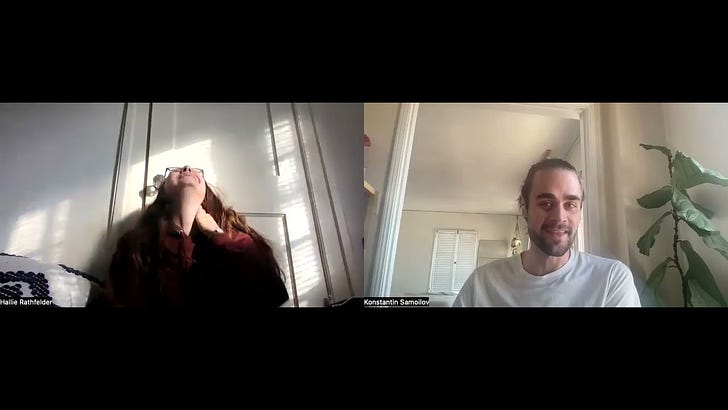



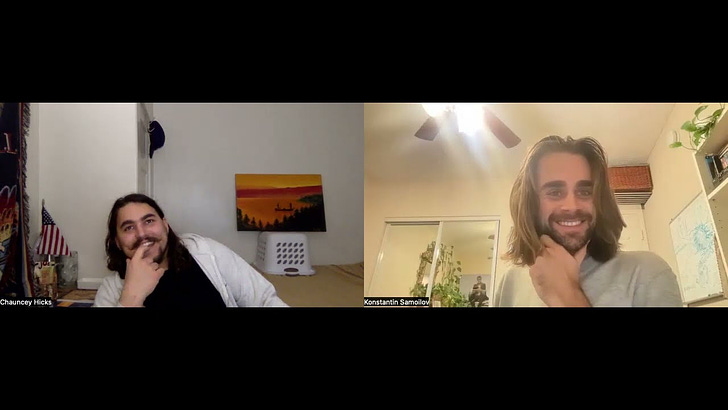
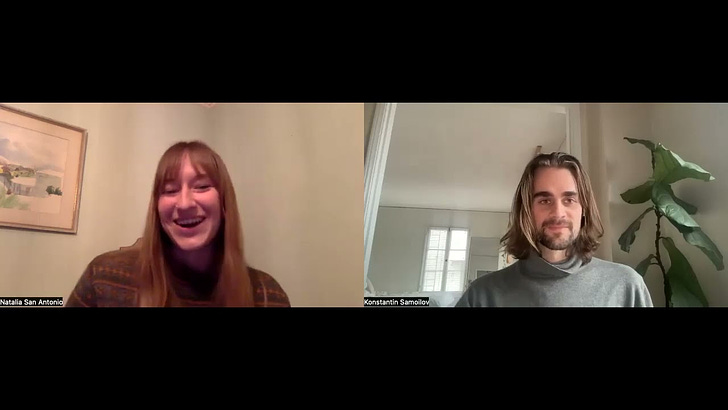
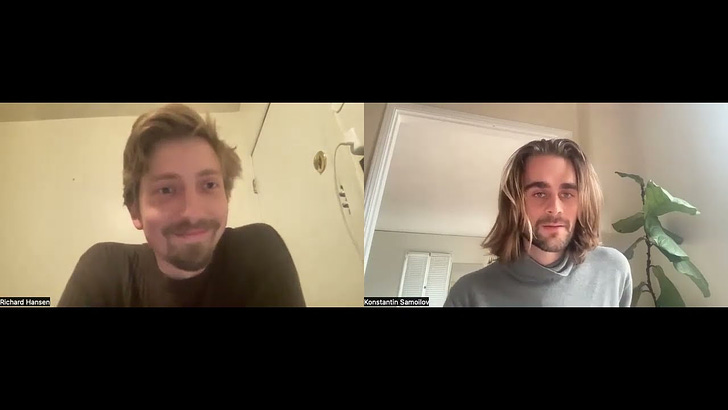
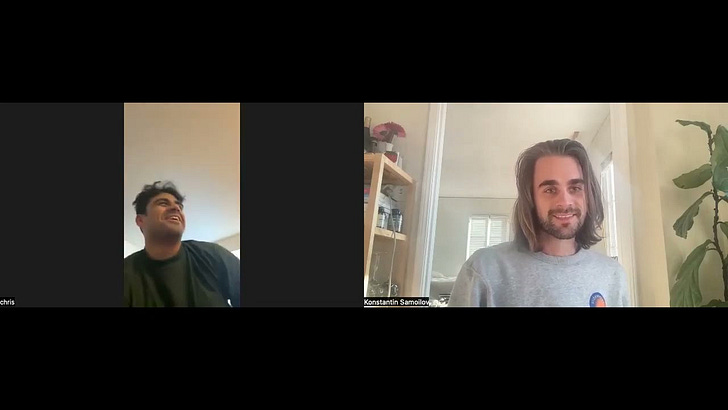


Share this post